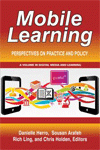
Mobile Learning
Perspectives on Practice and Policy
Edited by:
Danielle Herro, Clemson University
Sousan Arafeh, Southern Connecticut State University
Richard Ling, Nanyang Technological University
Chris Holden, University of New Mexico
A volume in the series: Digital Media and Learning. Editor(s): Danielle Herro, Clemson University. Remi Kalir, University of Colorado, Denver.
Published 2018
There can be no doubt that mobile technologies are here to stay. Global mobile traffic grew 74 percent in 2015 alone, with 563 million devices and connections added -- most of them tablets and Smartphones. This growth has been 4000-fold in the past 10 years and 400 million-fold in the past 15 years (Cisco, 2016). Mobile technologies permeate the lives of 21st century citizens as mainstays of organizational and institutional day-to-day operations, commerce, and communication and as tools used to support individuals’ personal, social, and career responsibilities. In both the corporate and educational worlds, e- and m-learning and marketing with mobile technologies are moving forward at breakneck speed with, in many cases, a blurring of traditional sector boundaries.
As neither the technology nor the uses are static, exploring practices and policies that underpin this quickly shifting mobile technology context is crucial for ensuring its intelligent, purposeful, and equitable use. This edited book provides a venue for researchers to share their work on mobile learning with a focus on uses for mobiles in informal settings and PK-20 classrooms, language learning, mobile gaming, leadership and policy issues, and what mobile learning in the future may be. It assists researchers and educators to consider and answer questions such as: What is “mobile learning” today? How can mobiles be used to enable learning? How is mobile learning crossing or connecting economic, social, and/or cultural sectors? How do specific cultural practices with media influence mobile learning (e.g., youth practices, educator practices, parent practices, community practices)? What are policy and leadership implications in supporting mobile learning? What policies, practices, and/or pedagogical approaches are necessary to move forward with mobiles in schools or universities? In what ways is mobile learning impacting education; including how students learn and teachers teach? What will/ should/might mobile learning look like in the future?
CONTENTS
Foreword. Preface. PART I: POLICY CONTEXTS FOR MOBILE LEARNING. Tensions Between the Local in the Global: A Cosmopolitan View of Mobile Learning Initiatives, Judith Dunkerly-Bean, Helen Crompton, and Char Moffit. The Role of Leadership and Professional Development to Overcoming Barriers to Mobile Learning in Formal Schooling, Liz Kolb. Mobile Learning Curricula: Policy and Potential, David Parsons and Kathryn MacCallum. U.S. Tweens Talk About Mobile Learning: Dominant Discourses, Danger, and the Importance of Information Seeking, Sousan Arafeh, Michael Kuszpa, Meghan Weller, and Thomas Mitchell. PART II: CONNECTING HISTORY AND COMMUNITY: LOCATION-BASED MOBILE LEARNING. STEMlandia: Using Mobile Technology to Get ’Em Outside, James L. Larsen, Jodi Asbell-Clarke, Barbara MacEachern, and Elizabeth Rowe. Community Inquiry With Mobile Asset Mapping, Ryan M. Rish, Aijuan Cun, Abigail Gloss, and Merve Pamuk. We Got This: Toward a Facilitator-Youth “Apprenticeship” Approach to Supporting Collaboration and Design Challenges in Youth-Designed Mobile Location-Based Games, Sara Vogel and Judith Perry. Augmenting National Historical Parks: A Pilot Study for Harpers Ferry, Laura A. Gillespie. PART III: MOBILE LEARNING IN PRE-K–12 EDUCATIONAL SETTINGS. Piecing the Puzzle Together: Building a Dialogue for Engaging Multiple Disciplines in Inquiry-Based Mobile Learning Through Professional Development, Cynthia C. Minchew Deaton, Sandra M. Linder, and Benjamin E. Deaton. Digital Leadership in Rural Middle School: Preparing Effective 21st Century Digital Citizens Via a Mobile Learning Curriculum, Jennifer L. Motter. BYOD in the Art Classroom: A Framework for Studio Learning, Aysenur Ozyer, Kyle Roberts, and Brent G. Wilson. Your iPhone Cannot Escape History, and Neither Can You: Self-Reflexive Design for a Mobile History Learning Game, Owen Gottlieb. About the Contributors.
-
Paperback9781641131223
Web price: $45.04 (Reg. 52.99)
-
Hardcover9781641131230
Web price: $80.74 (Reg. 94.99)
- eBook9781641131247

- EDU021000 - EDUCATION: Non-Formal Education
- EDU029000 - EDUCATION: TEACHING METHODS & MATERIALS: General
- TEC000000 - TECHNOLOGY & ENGINEERING: General
-
 Cultivating Democratic Literacy Through the Arts
Guiding Preservice Teachers Towards Innovative Learning Spaces in ELA Classrooms
Cultivating Democratic Literacy Through the Arts
Guiding Preservice Teachers Towards Innovative Learning Spaces in ELA Classrooms
-
 Effective Alternative Assessment Practices in Higher Education
Effective Alternative Assessment Practices in Higher Education
-
 Frameworks for Integrated Project-Based Instruction in STEM Disciplines
Frameworks for Integrated Project-Based Instruction in STEM Disciplines
-
 Negotiating Place and Space through Digital Literacies
Research and Practice
Negotiating Place and Space through Digital Literacies
Research and Practice
-
 Quarterly Review of Distance Education
Volume 24 #1
Quarterly Review of Distance Education
Volume 24 #1
-
 Supporting Leaders for School Improvement Through Self-Care and Wellbeing
Supporting Leaders for School Improvement Through Self-Care and Wellbeing
-
 Using Mobiles in Early Childhood and Elementary Settings
Using Mobiles in Early Childhood and Elementary Settings

